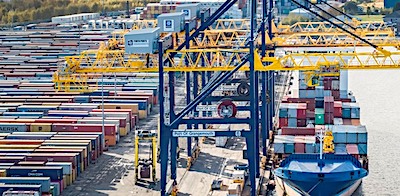Forth Green Freeport and Inverness and Cromarty Firth Green Freeport have been jointly selected by the Scottish and UK governments to become Scotland’s first Green Freeports.
The two winning bids will be supported by up to £52 million in start-up funding and will benefit from tax reliefs and other incentives through a combination of devolved and reserved powers.
The Forth Green Freeport bid aspires to deliver up to an additional 50,000 jobs across the UK, generate £6 billion in investment and contribute over £4 billion in GVA across sites in Grangemouth, Rosyth, Leith, Burntisland and Edinburgh Airport.
Its activities will focus on renewables, advanced manufacturing, alternative fuels, carbon capture utilisation and storage, shipbuilding, logistics and the creative industries.
The Forth Green Freeport consortium is a private and public partnership that includes Forth Ports, Babcock, INEOS, Edinburgh Airport, Scarborough Muir Group, Falkirk Council, Fife Council, and The City of Edinburgh Council.
The Inverness and Cromarty Firth bid aims to build a world-beating floating offshore wind manufacturing sector, with sites in the Cromarty Firth, Invergordon, Nigg, and Inverness.
It expects to create up to 25,000 new jobs and attract £2.6 billion in inward investment. In addition to offshore wind manufacturing, it will focus on green hydrogen and creating a new innovation cluster.
Applicants to become a Green Freeport in Scotland were required to demonstrate how they would contribute towards a just transition to net zero emissions by 2045 and create new, green jobs.
They were also required to set out how they would support high-quality employment opportunities with fair work conditions at their core.
Deputy First Minister John Swinney said: “This is a milestone achievement in the process to deliver Green Freeports for Scotland.
“Inverness and Cromarty Firth Green Freeport and Forth Green Freeport will support businesses to create high-quality, well-paid new jobs, promote growth and regeneration, and make a significant contribution to achieving our net zero ambitions.
“A rigorous joint selection process has been followed. The successful applicants showed a strong determination to embed fair work practices, including payment of the Real Living Wage, and to enshrine net zero initiatives in their work.
“We look forward to working closely with them to ensure they deliver maximum positive impact and become operational as soon as possible.
“We will also work with the unsuccessful bidders to consider how they can build on the plans set out in their bids to deliver jobs and growth in their regions outside the Green Freeports programme.
“Scotland has a rich history of innovation, trade and manufacturing and as we look to seize the many opportunities achieving net zero offers, the creation of these internationally competitive clusters of excellence will help us to create new green jobs, deliver a just transition and support our economic transformation.”
Charles Hammond, chief executive of Forth Ports and lead Forth Green Freeport bid partner, welcomed the shortlisting by the Scottish and UK Governments:
“Today’s shortlisting is great news for Scotland, for new green jobs and for the country’s drive to net zero,” said Hammond.
“Together with our consortium partners, our bid will re-industrialise the nation and create large scale economic development.
“Our green freeport will accelerate investment and generate 50,000 new green jobs by acting as a catalyst for new technologies and renewable energy manufacturing.
“This has the potential to unlock £6 billion of private and public investment for Scotland and create new training facilities, factories, logistics parks, rail, freight and fuel terminals and to enhance our creative industries.
“The benefits of trade will be spread widely into the communities that need it the most, through the establishment of a green growth investment corridor creating tens of thousands of jobs in low carbon logistics, renewable energy, green manufacturing and alternative fuels.
“These new jobs will not just be in Grangemouth, Leith and Rosyth, but in Glasgow and Edinburgh; the Lothians, Stirling and Falkirk; Dunfermline and Burntisland; and across the UK.”
